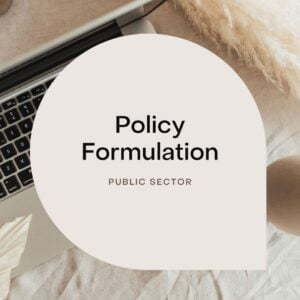Imagine a city struggling with rising air pollution levels despite having numerous environmental policies and regulations in place. A recent study found that nearly 60% of municipal policies fail to address the root causes of pollution due to outdated frameworks and a lack of adaptive strategies. This highlights a significant challenge in the public sector: the need for continuously evolving policies that can effectively tackle emerging issues.
In the public sector, policy formulation is a fundamental process that shapes how governments respond to societal needs and challenges. It involves developing new policies and updating existing ones to address current and emerging issues. Effective policy formulation ensures that public services are efficient, equitable, and responsive to the changing dynamics of society. It is a crucial mechanism through which governments can promote social welfare, economic development, and environmental sustainability.
Understanding Policy Formulation
Policy formulation in the context of public governance refers to the process of developing strategies and guidelines that address specific public issues. This involves identifying problems, setting objectives, and devising actionable plans to achieve desired outcomes. Policy formulation is a critical step in the policy cycle, which also includes agenda setting, policy implementation, and evaluation. It requires thorough research, analysis, and collaboration to ensure that the resulting policies are effective, equitable, and sustainable.
Importance
Effective policy formulation is crucial for several reasons:
Addressing Public Issues:
- Well-crafted policies are essential for solving complex societal problems such as poverty, healthcare, education, and environmental sustainability. They provide a structured approach to tackle these issues systematically.
Resource Allocation:
- Policies guide the allocation of public resources, ensuring that they are used efficiently and effectively to meet the needs of the population.
Promoting Social Equity:
- Policies help to ensure that all members of society have access to essential services and opportunities, promoting fairness and reducing inequalities.
Facilitating Economic Development:
- Strategic policies can stimulate economic growth, create jobs, and foster a favorable business environment, contributing to overall national prosperity.
Enhancing Governance:
- Clear and well-formulated policies provide a framework for decision-making and accountability, improving the overall effectiveness of public administration.
Challenges
Policy formulation is a complex process that faces several challenges, including:
Complexity:
Public issues are often multifaceted and interconnected, requiring comprehensive analysis and integrated solutions. Developing policies that address all relevant aspects can be challenging.
Stakeholder Diversity:
Policies affect a wide range of stakeholders, including government agencies, private sector entities, non-profit organizations, and the general public. Balancing the diverse interests and perspectives of these groups is a significant challenge.
Changing Environments:
Social, economic, and technological changes can rapidly alter the context in which policies operate. Policymakers must continuously update and adapt policies to remain relevant and effective.
Data Limitations:
Access to accurate and timely data is critical for informed policy formulation. However, data limitations can hinder the ability to fully understand issues and predict the impact of policy decisions.
Political and Institutional Constraints:
Political dynamics and institutional frameworks can influence the policy formulation process, sometimes leading to compromises that may dilute the effectiveness of policies.
Conclusion
In summary, understanding policy formulation involves recognizing its essential role in addressing public issues and navigating the challenges associated with developing and implementing effective policies. This knowledge is fundamental for anyone involved in public governance or interested in the processes that shape public life.

